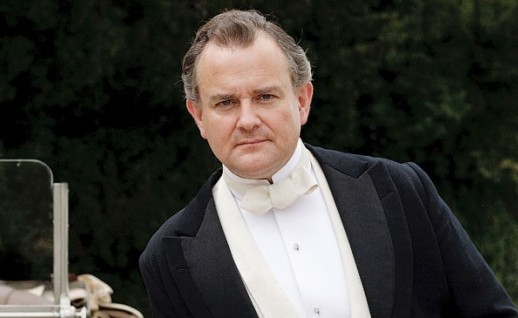Q&A by Tim Appelo for The Hollywood Reporter
The actor reveals how his and Maggie Smith’s characters resemble series creator Julian Fellowes and what Hollywood needs to learn from the hit’s 16 Emmy nominations.
The Hollywood Reporter: An Internet pundit recently asked, “Why does Hugh Bonneville keep getting nominated for Emmys? Like, is it actually that hard to play Lord Grantham?” Is it hard?
Hugh Bonneville: It’s my first nomination! If it looks that easy, I’m delighted.
THR: Are you like Lord Grantham?
Bonneville: He has a slower pulse than I do. And his sort of feudal world isn’t one I’m comfortable with.
THR: But you went to Cambridge University. Wasn’t it like Downton Abbey?
Bonneville: At Cambridge, you’ve got old buildings and quite a bit of tradition. I got a very low 2.2 [degree]. But my adult life wasn’t so cloistered.
THR: Why did Downton hit so big across so many demographics?
Bonneville: [Downton creator] Julian Fellowes consciously or unconsciously tapped into something with very broad appeal, with elements of soap, multistranded storylines, melodrama, a big sense of sweeping romance, of yearning looks and love unuttered, some great one-liners and some really sobbing, heartbreaking moments as well. He somehow concocted a delicious pudding with a spoonful for everyone.
THR: What’s the tastiest bit to you?
Bonneville: That it’s a proper ensemble, brilliantly cast — myself excepted, of course.
THR: Matthew Weiner said both Jon Hamm’s and Elisabeth Moss’s Mad Men characters contain parts of himself. Are there aspects of Fellowes in both your character and Dame Maggie Smith’s?
Bonneville: Quite true. I have no doubt that the idea of a benign dictator like Robert Grantham and the barbed wit of Grantham’s mother is very much wrapped up somewhere in Julian, and he’s thrilled to let it out.
THR: What’s the worst thing about your character?
Bonneville: He’s not very savvy or streetwise. He isn’t a businessman, which comes to the fore in the third series. I don’t think he’s a buffoon. His faults are his bombast, his assumption that the world doesn’t need to change. He’s not a mustache-twirling evil baron. He has conservative values by upbringing but liberal instincts. When the women take over Downton and make it a convalescent hospital, he’s rudderless. He has no other qualifications in life beyond keeping the esate going. He has no idea what’s going on outside the gates.
THR: And in the climactic courtroom scene, he gets his best pal and servant Bates (Emmy nom Brendan Coyle) a potential death sentence.
Bonneville: He’s so used to the world revolving around him that he’s a lousy witness. It’s his testimony that puts the rope around Bates’ neck.
THR: Why is America’s verdict on Downton so positive?
Bonneville: It’s an escape into a world of civility and mutual respect. In our modern world, there’s anger, uncertainty, joblessness.
THR: A world of noblesse without oblige.
Bonneville. Yes. I’ve had many letters saying people sit down as a family to watch Downton. People all over America have Downton Abbey teas — dress up in period frocks to watch it. It’s made people interested in the past. What would it be like to live in a world where love matches weren’t made and ruined overnight? Where the major event is the disappearance of a snuff box? Wouldn’t it be nice if someone changed you four times a day, and that could be your role in life? It’s a comfort zone. Juilian writes from the default position that people try to do good in the world rather than being full of shit. Even footman Thomas [Rob James-Collier] and O’Brien [Siobhan Finneran], plotting and scheming and smoking out back, have moments of redemption. I think people latch on to this.
THR: First The King’s Speech, then Downton — what should Hollywood learn from the sudden American hunger for period British entertainment?
Bonneville: Similarly, The Best Exotic Marigold Hotel did massively well. And it was for over-30s, which of course exhibitors don’t like. Cinema number crunchers are going to have to go to their calculators and say, “Hang on, maybe there is an audience that goes for films with gravitas or wisdom behind them.” Interesting, intelligent choices that come out of left field. Studios ignore the maturing audience at their peril. Of course it’s fun to have a popcorn movie, but my goodness, you need a decent diet. Otherwise your kidneys and your liver pack up.
THR: Fellowes mused to me about Downton going all the way up to the 1950s — it could leave off where Mad Men begins. And then Mad Men could go all the way to the present.
Bonneville: That’s a hilarious idea. Personally, I want him to take it all the way to Star Trek.









